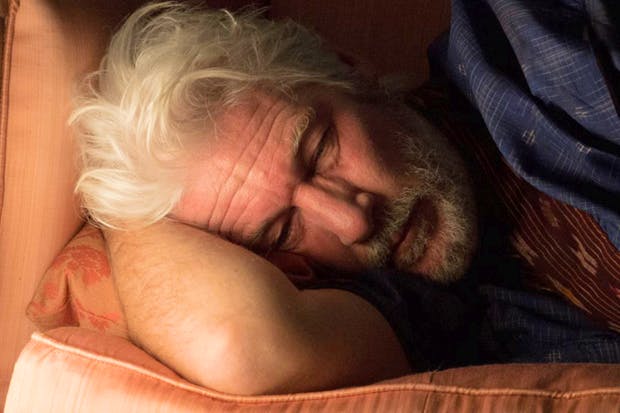The Benefactor is both a bad film and a thoroughly inexplicable one. It’s one of those what-were-they-thinking projects that wastes decent talents — Richard Gere and Dakota Fanning, most notably — for no discernible purpose and has you thinking throughout that whatever they were paid it wasn’t enough, and even if they’d been offered more, that wouldn’t have been enough, and so on, until all the money that currently exists in the world had been offered. And it still wouldn’t have been enough.
The film is written and directed by Andrew Renzi and stars Gere as Francis Watts, aka Franny, a multi-billionaire philanthropist whose wealth is never explained and who builds hospitals for children. (Therefore we have to fundamentally like him? What if I refuse?) The film opens with a fatal accident, when Franny is in a car with his best friend Bobby (Dylan Baker) and Bobby’s wife, Mia (Cheryl Hines). He is in the back, high on a spliff, when he leans forward to hug Bobby, who is driving, and distracts him. Bobby hits an oncoming vehicle, which takes out him and his wife. ‘Hugs can kill’ no road safety sign has ever said, but perhaps they should.
Skip five years, and when we catch up with Franny, we find he is riddled with guilt, has mutated into Billy Connolly grooming-wise, and swigs morphine straight from the bottle. I believe we are being told he’s in pain. But then his friend’s daughter, Olivia (Fanning), whom he has always adored, gets in touch. His nickname for Olivia is ‘Poodles’, as in ‘is that you, Poodles?’ when he answers the phone, and it’s just so ultra-creepy that every time he said it, which he does about 280 times, I felt a little something in me die.
But ‘Poodles’ — yup, just felt a little something die there — reanimates him. He shaves. He gets a haircut. She is now pregnant and married to a doctor, Luke (Theo James), to whom Franny gives a job at one of his unexplained children’s hospitals. He also pays off Luke’s loans, puts him on the hospital board, plus buys Poodles — yup, died again — the house she grew up in. But Franny does not respect boundaries and is always in their faces. Franny is sometimes charming and sometimes manipulative and sometimes sinister and sometimes kind in a way that makes no sense whatsoever in terms of any character arc. ‘I can’t relate to you, Franny,’ says Luke. ‘And that makes two of us,’ I’d have added, if asked. He’s a jumble of behaviours assembled to service the plot, or what plot there would be, if this film were coherent in any way.
 What was she thinking? Dakota Fanning as ‘Poodles’
What was she thinking? Dakota Fanning as ‘Poodles’
Frustratingly, this could have been a neat psychological thriller. What price for Franny’s help? Is he ever going to leave Luke and, you know, that woman alone? But nothing goes anywhere. There are, for example, a couple of scenes between Franny and Luke that have a homoerotic undercurrent but that storyline is abruptly dropped. Instead, the second half devotes itself to Franny’s morphine addiction, which comes to a head when his doctor decides to no longer prescribe it — as doctors do, just like that. Franny freaks and rages through the unexplained hospital and all I’m thinking is: Franny, very, very poor people who live on the streets seem able to score heroin, and you’re a multi-billionaire. Just go figure it out.
Fanning, who is usually such a credible actress, is given almost nothing to do beyond rub her prosthetic belly as the two men talk over her. Meanwhile, Gere is flamboyantly terrible, hamming it up until someone on set must have had to run out for more ham, and then more ham, until all the ham there is in the world had been deployed, and they had to start raising their own pigs. It then concludes flimsily with an unearned redemptive ending to do with the baby being born, and that’s no spoiler, as there’s nothing to spoil. This film does its worst all by itself.
Got something to add? Join the discussion and comment below.
Get 10 issues for just $10
Subscribe to The Spectator Australia today for the next 10 magazine issues, plus full online access, for just $10.














Comments
Don't miss out
Join the conversation with other Spectator Australia readers. Subscribe to leave a comment.
SUBSCRIBEAlready a subscriber? Log in